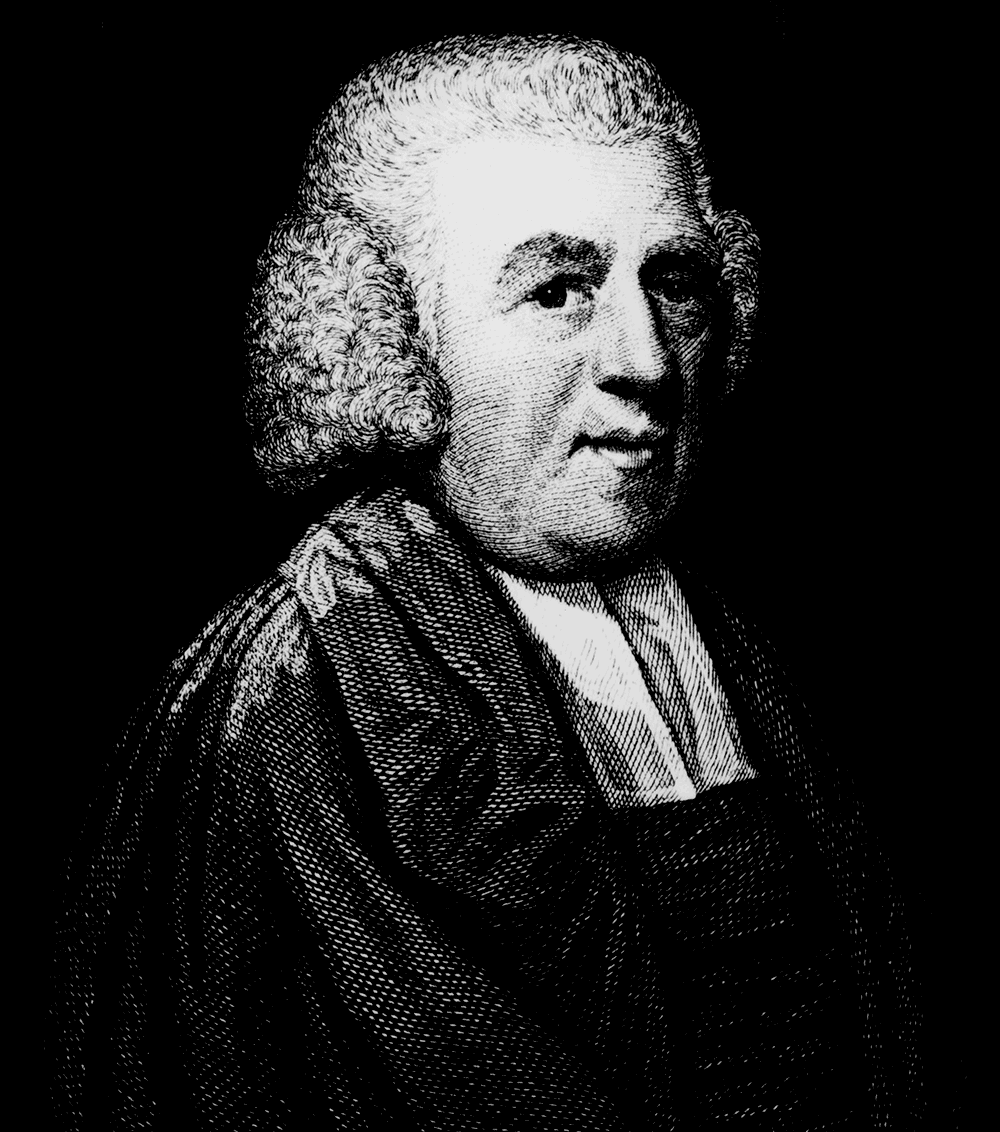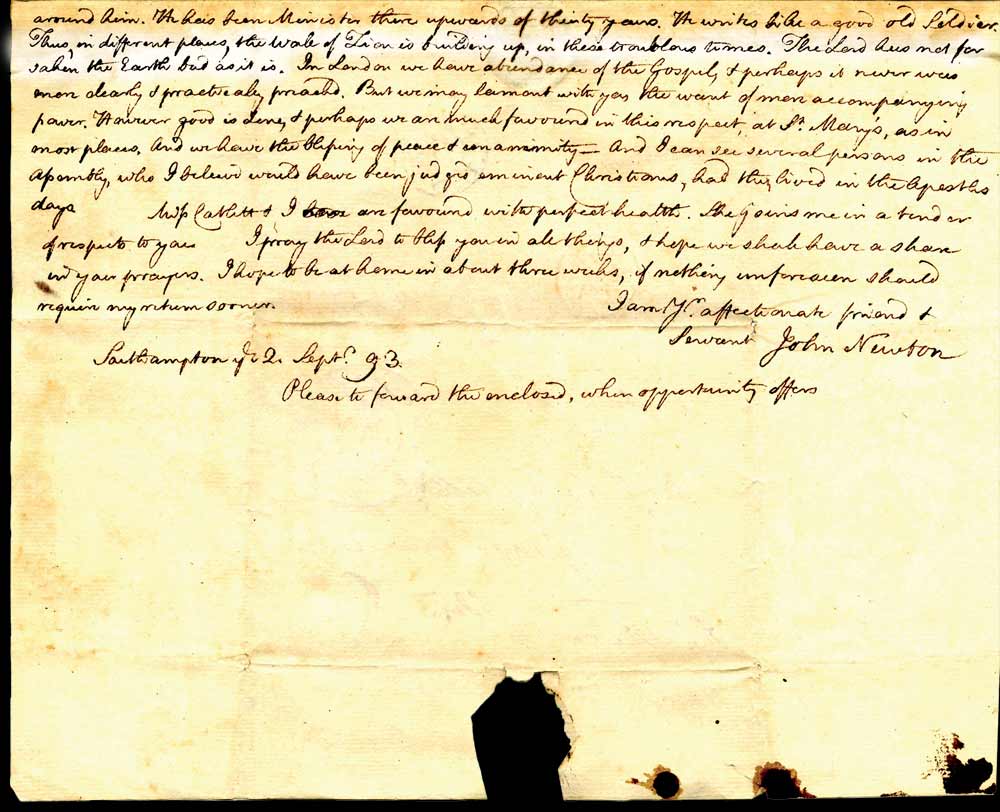
Life and Letters of “Amazing Grace” Author Shed Light on 18th-Century Evangelical Abolitionist Movement

1725
John Newton is born.
1744
Newton is press-ganged, forcibly conscripted into the British Royal Navy.
1745
Newton transfers to a slave ship off the coast of Sierra Leone.
1748
During a severe storm, Newton experiences religious awakening.
1754
Newton suffers an epileptic seizure and gives up the slave trade.
1764
Newton becomes a clergyman.
1773
Newton writes “Amazing Grace” to accompany his New Year’s Day sermon on 1 Chronicles 17:16–17.
1785
William Wilberforce, abolitionist leader, visits Newton’s home.
1788
Newton publishes “Thoughts
Upon the African Slave Trade.”
1789–1802
Range of SPU’s letters between Newton and Campbell.
1807
Britain abolishes slave trade,
but not slavery itself (Slave Trade Act of 1807). Newton
dies nine months after the act
is passed.
1833
Britain abolishes slavery throughout empire (Slavery
Abolition Act of 1833).
Cyd Kurtz opened the acid-free folder and removed the letter dated “London June 2, 1792.” The Seattle Pacific University graduate student studied the faded ink, the paper bearing the wear and spotting of age, the unfamiliar 18th-century English.
She read the author’s mention of youthful years spent in Africa, during which he was “such a compound of misery and mischief.” His prayer that the Lord might open the eyes of those “who know not what they do.” His grateful acceptance that “grace has long and strong arms.” And in closing, “your affectionate servant,” with the initials “J.N.”
In her hands was one of 43 letters held by the SPU Archives, written by slave-trader-turned-pastor John Newton (1725–1807), written mostly to the Scottish missions activist and abolitionist John Campbell (1766–1840). Campbell published many selections from these letters in 1811, but the collection has never been published in full.
According to University Archivist Adrienne Thun Meier ’04, 36 of the letters in the SPU collection are likely in Newton’s own hand, while seven are copies. Although further analysis and authentication lie ahead, the ink, the paper, the bits of red sealing wax, the British postal marks, the signature, and the content of the letters are consonant with the history and published writings of the man who was converted to Christ on the high seas while a slave trader, who became a champion of the gospel and of abolition, and who penned the words to the hymn “Amazing Grace.”
The historic letters arrived at Seattle Pacific in the early 1960s thanks to Donald Demaray — whose father, C. Dorr Demaray, served as Seattle Pacific’s fourth president. Demaray, dean of the School of Religion 1960–66, had done his doctoral research into the life of John Newton. When he learned that a bundle of Newton’s and Campbell’s letters was being offered in a private sale for less than $100, he believed their historical worth to other researchers was invaluable.
Demaray wanted the Newton correspondence for the SPU Library. “SPU being Wesleyan and evangelical, any of the 18th-century theologians sparked interest,” says Demaray, now professor emeritus at Asbury Theological Seminary. “Though Newton was a mild Calvinist, he knew the Wesleys. John Wesley had pushed for his ordination; Newton was a pallbearer at Charles Wesley’s funeral.”
Then-head librarian Margaret Bursell made the acquisition. The letters were first kept in the Weter Library, then moved to the Ames Library when it opened in 1994. They remained uncatalogued until such time as they could be scanned, transcribed, and authenticated.
It wasn’t until late 2012 that curation began in earnest. For its clear statement against slavery, Theology and Philosophy Librarian Steve Perisho included one 1793 letter in a collection of Wesleyan resources exhibited in 2013, when SPU hosted the Fourth Joint Meeting of the Wesleyan Theological Society and the Society of Pentecostal Studies.
After hearing Meier speak in 2013 about the letters in Professor Rick Steele’s “Global Christian Heritage” class, Kurtz began to contribute research hours as part of a practicum for her master’s degree in Christian studies through Seattle Pacific Seminary. A few hours each week in the months since, she has pored over and transcribed the manuscripts. It took her most of six months of “living with the letters” to adjust to the language, grammatical idiosyncrasies, and sometimes cramped penmanship.
Steele pairs the Newton texts with The Interesting Narrative of the Life of Olaudah Equiano (1789), one of the first slave narratives, and another text that, like Newton’s writings, was influential in Britain’s abolition of the slave trade in 1807.
The class discussion on the letters was, he adds, among the most animated of the entire course, “stimulated by the fact that of the 15 students enrolled, five were African — two Congolese, two Kenyan, and one Egyptian — for whom the legacy of European imperialism is very much alive.”
“Historical materials such as these letters provide a tangible connection with another time,” says University Librarian Michael Paulus.
Steele notes that Newton was part of “a loose but extensive network of late-18th- and early-19th-century British evangelicals including William Wilberforce who corresponded and collaborated on the effort to abolish slavery throughout the Empire.”
“Will the Lord provide us with another William Wilberforce–John Newton team for our era of trafficking?” Demaray wonders. “I pray so.”

The exterior of one letter indicates it was sent from London in June of 1792 to Mr. J. Campbell in Edinburgh, Scotland. Postmarks and traces of sealing wax are visible.
In this letter held by the SPU Archives, Newton complains that “a college in America, I think in New-Jersey” (now Princeton University) has awarded him an honorary doctorate:
“As to the title itself, I renounce it heartily; nor would I willingly be known by it, if all the universities in Europe conferred it upon me. My youthful years were spent in Africa, and I ought to take my degrees (if I take any) from thence.”
Do you have rare books or unique materials that could find a home in the SPU Library’s special collections? Learn about the Library’s interests and giving options at spu.edu/librarygiving.

In another letter, dated September 2, 1793, Newton reflects on many topics: his vocation as a preacher, his conversion that occurred while he was still a slave trader, and the injustice of capital punishment for the crime of robbery (a radical view in his day). He also mentions a letter received from America about a revival — the religious movement now known as the Second Great Awakening was getting underway.
“The preaching of the gospel is indeed a great privilege, which cannot be safely neglected while in our power, and will note, so long as we possess out spiritual senses.”
“I think my heart was never more warm and fixed, than during my two last voyages to Africa, though I was engaged in traffic, which I now see was unlawful and abominable.”
“I think, if I was a lawgiver, I would not make robbery a capital crime; and therefore I should be unwilling to prosecute for it.”

“My heart aches for the final issue. But as he reigns over all, he can, and he will, make all work for the glory of his name.”
“I have a letter from Dr. Robbins of Plymouth in Massachusetts, whose name I never heard of before. I wish I could show it you. He gives an account of a sudden revival of religion in this place…
Thus, in different places, the wall of Zion is building up in these troublous times. The Lord has not forsaken the earth, bad as it is.”

View the Newton letters at SPU’s Digital Commons.